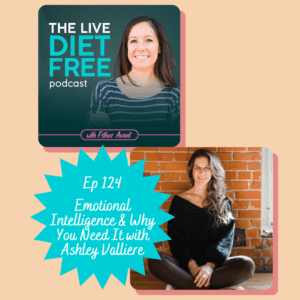When you hear the term emotional intelligence, are you rolling your eyes at this abstract, woo-woo concept that can’t possibly apply to your journey?
I get it.
I would have done the same a few years ago.
I really didn’t have an understanding of what it meant to be emotionally intelligent and I certainly didn’t see how it could relate to anything I was going through.
What I’ve learned, though, is that it impacts every aspect of life (even the parts that don’t seem connected) and learning how to harness it can make a HUGE difference in how you approach those roadblocks that inevitably pop up.
EI Educator, Ashley Valliere, joins me this week on the podcast and she’s teaching us what EI even is, why we need it, and sharing practical tips to work on developing it.
We even dive into how EI can help you overcome emotional eating!
You can listen here or by clicking the link below.
Or keep reading the post below:
What is Emotional Intelligence
Emotional Intelligence can be broken down into four categories:
- self awareness
- self regulation
- social awareness
- relationship awareness
Each category can then be broken down even further to fully understand what emotional intelligence encompasses.
Self Awareness
- How aware are you of your own emotions/emotional state?
- Can you differentiate emotions?
- Can you hold more than one at a time?
- Self confidence
- Do you recognize how your behavior affects others around you?
- Are you aware of how others affect and influence your emotional state?
Self Regulation
- How aware are you of your triggers?
- Do you have tools to deal/cope with triggers as they arise?
- Are you aware of your limits and boundaries?
- Can you keep impulses and reactions in check?
- Are you flexible to changes?
- Are you able to stay the course on goals even with disruptions appear?
Social Awareness
- Can you read the room, pick up on energies (and be able to keep them separate from yourself)?
- Are you compassionate to others?
- Do you listen to others when they speak without interjecting with your own stories?
- Are you empathetic to others?
Relationship Management
- Do you get along with others while maintaining your own boundaries and respecting those of others?
- Do you handle conflict with grace and poise?
- Are you able to communicate what you’re experiencing even when the conversation is hard?
- Are you sensitive to the other persons feelings even when emotions are high?
- Are you able to consider the other persons POV even if it doesn’t match yours and you feel justified in your emotion?
How to Develop It
Developing emotional intelligence isn’t a straight path where you can just connect the dots and be done with it.
It’s an ongoing process of recognizing your struggles and applying the appropriate steps to become the best version of yourself.
When you encounter a situation where one of the pillars of emotional intelligence is in front of you, get curious about your reactions.
Walk through the questions under each pillar and decide if your actions are in line with the positive side or the negative side.
Recognize that there will be times when you ask yourself something like, “Am I aware of how my actions are affecting others?” and the answer may be no.
It might feel uncomfortable to admit that truth, but it allows you the opportunity to then work on replacing that reaction with a more positive one so that when a similar situation arises in the future, you’ll be more prepared to handle it in a positive way.
Ashley tells us that, “Just be so curious, because when you come with curiosity, you’re not coming with judgment. And the judgment is what’s going to slow you down and hold you back.”
The key to developing emotional intelligence is to be curious about yourself, your actions, your reactions, and how you interact with the world around you.
Using Emotional Intelligence to Overcome Emotional Eating
The “sway test” is a tool that Ashley says can be useful to overcoming emotional eating.
It ultimately allows you to become more in-tune with your body while also disrupting the thought patterns that can often lead to emotional eating and overeating.
To implement the sway test, Ashley suggests, before making a decision, start talking to your body and asking it yes or no questions.
To set up for the sway test, make sure your weight is even on left and right side, so your your weight’s right in the center. Put your hand on your heart and ask your body, “Truth Body, show me ‘yes.’
You’ll either sway forward or you’ll sway backwards and that is your body’s ‘yes.’ Then you continue asking your body questions about what it needs and wants, waiting for the response.
I know this seems a little woo-woo, but in taking these steps you are allowing yourself a moment to pause before diving into the pantry for the next snack.
Your also taking the advice of “listen to your body” a little further by turning it into a conversation.
Our Gone for Good program addresses the emotional aspects of weight loss that are holding you back from reaching your goals. Check out https://www.estheravant.com/coaching for more info about how we can help you on the road to developing emotional intelligence.


